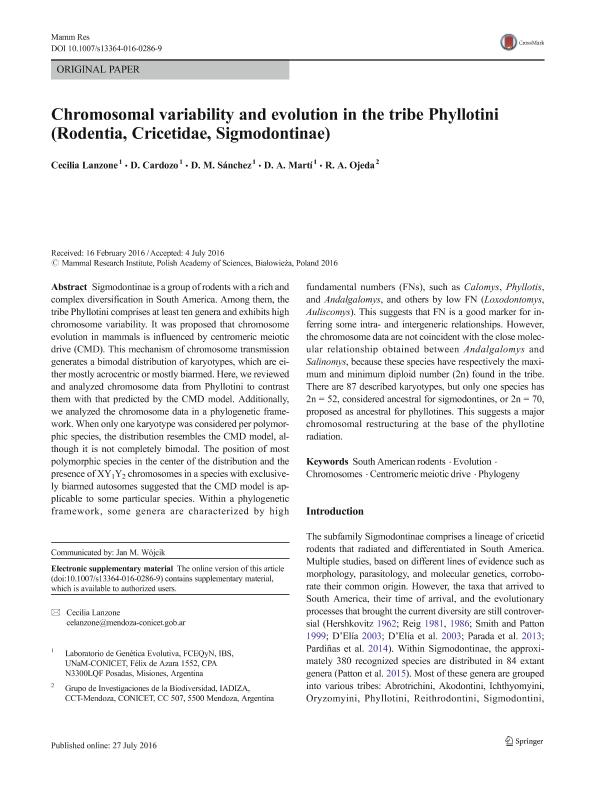Artículo
Chromosomal variability and evolution in the tribe Phyllotini (Rodentia, Cricetidae, Sigmodontinae)
Lanzone, Cecilia ; Cardozo, Dario Elbio
; Cardozo, Dario Elbio ; Sanchez, Denisse Mavis
; Sanchez, Denisse Mavis ; Marti, Dardo Andrea
; Marti, Dardo Andrea ; Ojeda, Ricardo Alberto
; Ojeda, Ricardo Alberto
 ; Cardozo, Dario Elbio
; Cardozo, Dario Elbio ; Sanchez, Denisse Mavis
; Sanchez, Denisse Mavis ; Marti, Dardo Andrea
; Marti, Dardo Andrea ; Ojeda, Ricardo Alberto
; Ojeda, Ricardo Alberto
Fecha de publicación:
10/2016
Editorial:
Springer
Revista:
Mammal Research
ISSN:
2199-2401
e-ISSN:
2199-241X
Idioma:
Inglés
Tipo de recurso:
Artículo publicado
Clasificación temática:
Resumen
Sigmodontinae is a group of rodents with a rich and complex diversification in South America. Among them, the tribe Phyllotini comprises at least ten genera and exhibits high chromosome variability. It was proposed that chromosome evolution in mammals is influenced by centromeric meiotic drive (CMD). This mechanism of chromosome transmission generates a bimodal distribution of karyotypes, which are either mostly acrocentric or mostly biarmed. Here, we reviewed and analyzed chromosome data from Phyllotini to contrast them with that predicted by the CMD model. Additionally, we analyzed the chromosome data in a phylogenetic framework. When only one karyotype was considered per polymorphic species, the distribution resembles the CMD model, although it is not completely bimodal. The position of most polymorphic species in the center of the distribution and the presence of XY1Y2 chromosomes in a species with exclusively biarmed autosomes suggested that the CMD model is applicable to some particular species. Within a phylogenetic framework, some genera are characterized by high fundamental numbers (FNs), such as Calomys, Phyllotis, and Andalgalomys, and others by low FN (Loxodontomys, Auliscomys). This suggests that FN is a good marker for inferring some intra- and intergeneric relationships. However, the chromosome data are not coincident with the close molecular relationship obtained between Andalgalomys and Salinomys, because these species have respectively the maximum and minimum diploid number (2n) found in the tribe. There are 87 described karyotypes, but only one species has 2n�=�52, considered ancestral for sigmodontines, or 2n�=�70, proposed as ancestral for phyllotines. This suggests a major chromosomal restructuring at the base of the phyllotine radiation.
Archivos asociados
Licencia
Identificadores
Colecciones
Articulos(CCT - NORDESTE)
Articulos de CTRO.CIENTIFICO TECNOL.CONICET - NORDESTE
Articulos de CTRO.CIENTIFICO TECNOL.CONICET - NORDESTE
Citación
Lanzone, Cecilia; Cardozo, Dario Elbio; Sanchez, Denisse Mavis; Marti, Dardo Andrea; Ojeda, Ricardo Alberto; Chromosomal variability and evolution in the tribe Phyllotini (Rodentia, Cricetidae, Sigmodontinae); Springer; Mammal Research; 61; 4; 10-2016; 373-382
Compartir
Altmétricas



